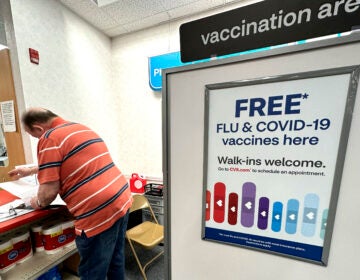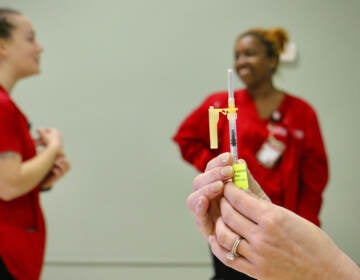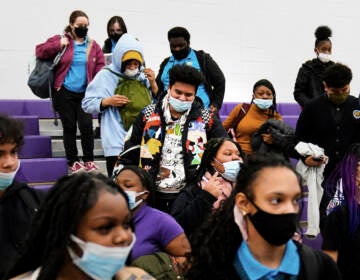Coronavirus update: N.J. allows larger outdoor groups, takes hatchet to budget
Without billions in federal aid, the state says it will cut spending on tax relief, aid to colleges and a slew of other programs.
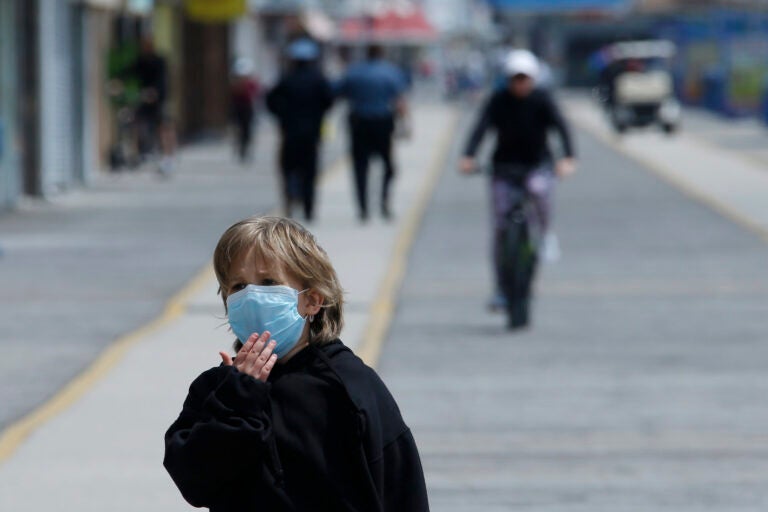
A boy adjusts his mask as he walks down the boardwalk, Thursday, May 21, 2020 in Wildwood, N.J. (AP Photo/Matt Slocum)
Are you on the front lines of the coronavirus? Help us report on the pandemic.
New Jersey reported 1,394 new coronavirus cases Friday, bringing the state’s total to 152,719.
Another 146 people died of complications from COVID-19. The state has now lost 10,985 residents to the pandemic.
N.J. raises cap on outdoor gatherings to 25
Twenty-five people can gather outdoors — up from the previous limit of 10 — under an executive order Gov. Phil Murphy said he would sign Friday.
Indoor gatherings remain capped at 10 people, a restriction first set in March to slow the spread of the virus.
“So if you were looking forward to gathering with your neighbors for a Memorial Day cookout, you may do so, so long as social distancing and personal responsibility remain the order of the day,” Murphy said.
The governor also said recreational campgrounds will reopen immediately, and capacity limits on outdoor activities like charter fishing outings, batting cages and driving ranges are similarly increased to 25.
The new rules do not apply to outdoor seating at bars and restaurants, which remain limited to take out and delivery. Under a new law, those establishments can now sell to-go mixed drinks and cocktail kits.
‘Inconceivable’ crisis triggers deep spending cuts
New Jersey should cut $1.3 billion in spending on tax relief, aid to colleges and a slew of other programs in the current fiscal year to deal with the coronavirus-induced financial challenges that were “inconceivable just a few months ago,” state Treasurer Elizabeth Muoio said Friday in unveiling an updated budget proposal.
The state should also reduce by $336 million the aid that Murphy previously proposed for school districts in the coming academic year, and defer more than $2 billion in other spending.
The Murphy administration’s plan does not propose new taxes for the current fiscal year, which now ends Sept. 30 after it was extended by three months. But Murphy on Friday did not rule them out after that.
The plan requires the Legislature’s approval.
Budget officials expect New Jersey to take a roughly $10 billion revenue hit through June 2021, a daunting sum compared to a roughly $40 billion annual budget. That figure does not include new costs incurred fighting the coronavirus pandemic, which total about $200 million so far, they said.
Murphy used his daily news briefing to again call for substantial federal aid to states that, like New Jersey, have been devastated by the disease, as well as for state lawmakers to grant him emergency borrowing powers.
“Time is of the essence,” he said.
Less tax relief for elderly, low-income homeowners
One of the largest programs proposed to be cut this fiscal year — valued at $135 million — is the popular Homestead Benefit credit, which helps thousands of elderly, disabled and low-income homeowners offset New Jersey’s notoriously steep property taxes.
Other line items poised to be slashed include $103 million in support to Rutgers and other “senior public colleges,” $68 million for anti-addiction programs and $10 million for county colleges.
Among the spending that Murphy wants to defer into the next fiscal year is a $951 million payment to the public-employee pension system and a $467 million payment to school districts.
Muoio said the state intends to make those payments, just a month later than planned.

Get daily updates from WHYY News!
‘Worse than the Great Recession’
Muoio said that sales tax revenue alone — generated by consumer spending that has been stymied by widespread business closures — is expected to decline 33% from May to July compared to the same period a year earlier.
Through June 2021, that tax is expected to bring in nearly $3 billion less than previously expected, Muoio said.
“A decline of this magnitude would be worse than the Great Recession,” she said, noting that the worst monthly year-over-year sales tax decline during that economic downturn was 18.4%.
The sales tax in New Jersey’s second-largest source of revenue, after the income tax.
State-run test sites to run through June
New Jersey’s two state-run, mass testing sites — at Bergen Community College and PNC Bank Arts Center in Monmouth County — will remain open through June, a month longer than previously anticipated, Murphy said Friday.
“This otherwise was only going to be until the end of May,” he said. “That’s huge.”
The sites are run in partnership with the Federal Emergency Management Agency, which Murphy said granted the extension and promised to raise the testing capacity at both locations.
Residents no longer need to be showing symptoms of COVID-19 to be tested there.
WHYY is your source for fact-based, in-depth journalism and information. As a nonprofit organization, we rely on financial support from readers like you. Please give today.


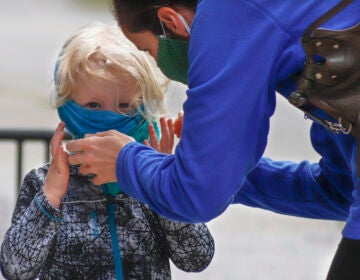
![CoronavirusPandemic_1024x512[1]](https://whyy.org/wp-content/uploads/2020/03/CoronavirusPandemic_1024x5121-300x150.jpg)
